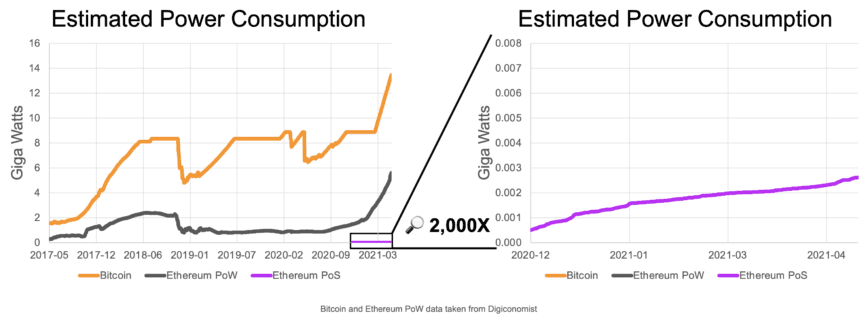
Shutterstock photo by Maeching Chaiwongwatthana
Ethereum Staking Will Drop Power Consumption by 99%
Ethereum's energy consumption will drop dramatically as it transitions from mining to staking.
Ethereum will reduce its energy consumption by 99.95% following its transition to proof-of-stake, according to a new blog post from Carl Beekhuizen of the Ethereum Foundation.
How Much Less Energy Will ETH Use?
Beekhuizen estimated there are 87,000 at-home stakers using about 100W of energy for a total of 1.64 megawatts. Additionally, there are another 52,700 exchanges and custodial services that use about 100W per 5.5 validators for a total of 0.98 megawatts.
Based on those estimates, Beekhuizen says that Ethereum will consume about 2.62 megawatts when it switches to proof-of-stake.
Beekhuizen added that this estimate may be too large. He noted that his own personal staking setup was optimized to use 15W, while some staking services use as little as 5W per validator.
This means that Ethereum will no longer use the energy equivalent of a country or even a city. Instead, its total consumption will be comparable to a small town that contains around 2100 homes.
Additionally, Beekhuizen drew attention to the fact that Ethereum’s proof-of-stake network will be approximately 7,000 times more energy efficient than Bitcoin, as seen in the chart below:

Staking Will Use Some Energy
Though this reduction in energy consumption was expected, the Ethereum Foundation is clearly attempting to be transparent by indicating that proof-of-stake nodes do consume some energy.
But unlike the mining system that Ethereum currently relies on, staking participants will not competitively use energy to discover a block. Instead, block discovery will be based on the amount of ETH that a user has staked along with various related factors.
The news is especially relevant in light of Tesla’s decision to drop Bitcoin payments due to the fact that Bitcoin mining demands large amounts of energy. It is not clear if the firm is considering ETH.
Disclaimer: At the time of writing this author held less than $75 of Bitcoin, Ethereum, and altcoins.

 Earn with Nexo
Earn with Nexo